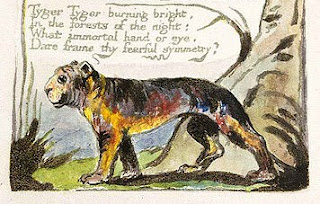William
Blake (1757-1827) was
born in London and was educated at home until the age of ten. He then enrolled
at a drawing school until he became an engraver. From an early age Blake
exhibited talent both as an artist and a poem. He has had mystical vision that
are said to be the inspirations for many of his poems. He invented illuminated
printing which he used to print the illustrations to his poems in his books Songs
of Innocence (1789) and Songs of
Experience (1794).
“The Chimney Sweeper” is the title of two poems written by William Blake.
The one below was published under Songs of Innocence (1789) while the other was published under Songs of Experience (1794). The poem portrays the miserable experience
of children—some as young as four or five—who were forced to clean chimneys in
English in the 18th and 19th centuries.
Child chimney sweepers in New York, photo by Havens O. Pierce, late 19th century. (Image from Wikipedia)
The Chimney-SweeperWhen my mother died I was very young,And my father sold me while yet my tongueCould scarcely cry 'Weep! weep! weep! weep!'So your chimneys I sweep, and in soot I sleep.There's little Tom Dacre, who cried when his head,That curled like a lamb's back, was shaved; so I said,'Hush, Tom! never mind it, for, when your head's bare,You know that the soot cannot spoil your white hair.'And so he was quiet, and that very night,As Tom was a-sleeping, he had such a sight!--That thousands of sweepers, Dick, Joe, Ned, and Jack,Were all of them locked up in coffins of black.And by came an angel, who had a bright key,And he opened the coffins, and set them all free;Then down a green plain, leaping, laughing, they runAnd wash in a river, and shine in the sun.Then naked and white, all their bags left behind,They rise upon clouds, and sport in the wind;And the angel told Tom, if he'd be a good boy,He'd have God for his father, and never want joy.And so Tom awoke, and we rose in the dark,And got with our bags and our brushes to work.Though the morning was cold, Tom was happy and warm:So, if all do their duty, they need not fear harm.
“The Tyger” was
also published under Songs of Experience. It has a sister poem entitled “The Lamb” which was published
under Songs of Innocence.
Detail from an original plate of Songs of Experience by William Blake. (Image from Wikipedia)
The TygerTyger! Tyger! burning brightIn the forests of the night,What immortal hand or eyeCould frame thy fearful symmetry?In what distant deeps or skiesBurnt the fire of thine eyes?On what wings dare he aspire?What the hand, dare seize the fire?And what shoulder, & what art,Could twist the sinews of thy heart?And when thy heart began to beat,What dread hand? & what dread feet?What the hammer? what the chain?In what furnace was thy brain?What the anvil? what dread graspDare its deadly terrors clasp?When the stars threw down their spears,And water'd heaven with their tears,Did he smile his work to see?Did he who made the Lamb make thee?Tyger! Tyger! burning brightIn the forests of the night,What immortal hand or eyeDare frame thy fearful symmetry?
“The
Garden of Love” was published under Songs of Experience. It is seen as an indictment against
organized religion (specifically the Church of England) alleged repression on
the naturalness of love.
Detail from a plate in Songs of Experience by William Blake. (Image courtesy of Wikipedia)
The Garden of Love
I laid me down upon a bank,
Where Love lay sleeping;
I heard among the rushes dank
Weeping, weeping.
Then I went to the heath and the wild,
To the thistles and thorns of the waste;
And they told me how they were beguiled,
Driven out, and compelled to the chaste.
I went to the Garden of Love,
And saw what I never had seen;
A Chapel was built in the midst,
Where I used to play on the green.
And the gates of this Chapel were shut
And 'Thou shalt not,' writ over the door;
So I turned to the Garden of Love
That so many sweet flowers bore.
And I saw it was filled with graves,
And tombstones where flowers should be;
And priests in black gowns were walking their rounds,
And binding with briars my joys and desires.
"The Clod and
the Pebble" was published under Songs of Experience. It contrasts the pessimistic attitude of a
clod, a piece of mud, from the optimistic one of a smoothed pebble in a stream.
The Clod and the Pebble"Love seeketh not itself to please,
Nor for itself hath any care,
But for another gives its ease,
And builds a heaven in hell's despair."
So sung a little Clod of Clay,
Trodden with the cattle's feet,
But a Pebble of the brook
Warbled out these metres meet:
"Love seeketh only Self to please,
To bind another to its delight,
Joys in another's loss of ease,
And builds a hell in heaven's despite."
R
E F E R E N C E S
Abcarian R. & M. Klotz.
(2000). Literature: Reading and writing
the human experience (7th shorter ed.) Boston & New York:
Bedford/St. Martin’s.
“The
Chimney Sweeper”. Wikipedia.
Retrieved: September 4, 2013 from http://en.wikipedia.org/wiki/The_Chimney_Sweeper.
“Chimney
Sweep”. Wikipedia. Retrieved: September
4, 2013 from http://en.wikipedia.org/wiki/Chimney_sweep.
“The
Tyger”. Wikipedia. Retrieved: September
4, 2013 from http://en.wikipedia.org/wiki/The_Tyger.
“The
Garden of Love”. Wikipedia.
Retrieved: September 4, 2013 from http://en.wikipedia.org/wiki/The_Garden_of_Love.
“The
Clod and the Pebble”. Wikipedia.
Retrieved: September 4, 2013 from http://en.wikipedia.org/wiki/The_Clod_and_the_Pebble.
.jpg)


No comments:
Post a Comment